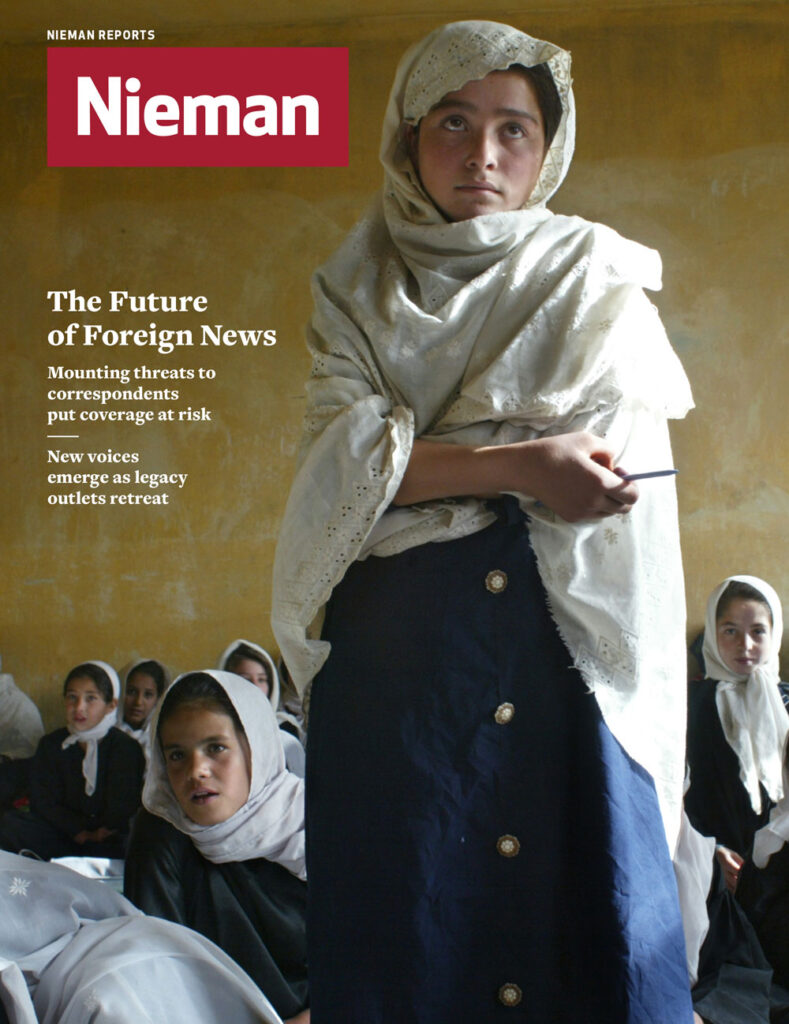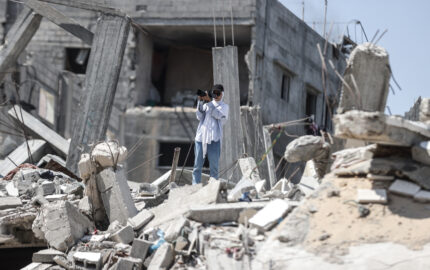In 1992, when I went to Sarajevo as a young and idealistic reporter to cover the Balkan wars, there were no hostile environment courses and no PTSD de-briefings. We learned about safety from the bad fortune of others. It was rudimentary, self-taught training: trial and error. I learned so much from those wars, and I learned more in the coming years from the series of risk and security courses I took. I would not want to perform a wartime tracheotomy or treat a sucking chest wound, but if I had to, I could.
When I started covering Syria at the end of 2011, I was technically freelance but a freelancer who demanded major conditions—a contract and war insurance, for starters—before I would get on a plane. I was lucky to have major organizations—The New York Times, Harper’s, Granta, The Nation Institute—backing me. But I would have asked for it anyway.
I had grown ultra-wary of kidnapping, and I had lost many friends and seen many more maimed. The father of my son, a reporter for France 2, was shot in the jaw by a sniper in Libya. I saw how his news station organized his evacuation and follow-up treatment. I needed to know someone had my back if that happened to me.
Freelancing has changed a lot since the Balkan days. The Arab Spring opened the door to a new breed of freelancer, and it alarms me. Starting with Libya, a new crowd of reporters flooded the region. Some were former soldiers; a few were mercenaries who had come to fight then continued to act as quasi-reporters, filming, writing stories, blogging, or appearing on CNN. Some were Arabists or students who watched Hollywood films and thought the life of a war correspondent was glamorous. They left Brooklyn, Los Angeles or London and flew to Cairo, then drove to Benghazi with a few hundred dollars, a sleeping bag and their MacBook Airs. Some had not reported before; some were new to the region. Their news sources were websites (Vice, BuzzFeed) I had never heard of, and they checked for breaking news on Twitter, not AP or Reuters.
As an established reporter, I want to pass on the baton, particularly to young women. Mentoring in this profession is hugely important. But learning to report war has to be done in a responsible way, not on the battlefield. We need to educate a new generation of conflict journalists who will do the fieldwork crucial to human rights reporting, to documenting war crimes, to understanding shifting regional borders. In many ways, this is a job for the young and fit. You need energy, stamina, and—this is mainly important for female reporters—you need to be emotionally free. It’s hard to cover a war with babies, and it’s hard to think about babies and having a “normal life” when you get used to covering war.
Having a child changed me radically as a journalist. It made me more aware of taking risks. I went from someone who crossed front lines, crawled through barbed wire, and lived in trenches to someone who was cautious. In some ways, I lost my nerve. But that is a good thing. I don’t ever want to live through the destruction of Sarajevo again, but I do want to continue reporting on how civilians are affected by war and how society evolves post-conflict.
My concern now, along with many of my colleagues, is how we keep reporting stories like Syria, given the kidnapping crisis. We need conflict reporters who will, in that clichéd term, bear witness. But we need to properly prepare them, or we will have legions more locked away in dark underground cells in Aleppo because they flippantly crossed a border when they should not have.
Freelancers bristle at the notion of accreditation, feeling it turns the press corps into an elitist profession of those who are approved and those who are not, but I favor accreditation, particularly in Syria. A proper accreditation system would make war insurance and hostile environment training necessary criteria. Perhaps a system of impromptu press centers set up at borders and near points of entry where journalists could exchange information, find translators or drivers who have been used and approved before, and get their press cards. Proving you have an assignment from a legitimate organization; proof of insurance (Reporters Without Borders issues cards) and leaving behind important contact information in case of emergency.
A grander notion might be, with some funding and backing, we set up press centers that also offer security training in situ, or a security adviser for those who do not have someone remotely working for them, or accompanying them.
These are all early thoughts that I have been discussing with colleagues and groups like Committee to Protect Journalists and Reporters Without Borders. We need to think it through, because we need to preserve lives. At the same time, we need to train reporters—seasoned and beginners—on how we can approach working on ISIS and other terrorism-driven stories. Unfortunately, this is the future of reporting in the Middle East.
When I started covering Syria at the end of 2011, I was technically freelance but a freelancer who demanded major conditions—a contract and war insurance, for starters—before I would get on a plane. I was lucky to have major organizations—The New York Times, Harper’s, Granta, The Nation Institute—backing me. But I would have asked for it anyway.
I had grown ultra-wary of kidnapping, and I had lost many friends and seen many more maimed. The father of my son, a reporter for France 2, was shot in the jaw by a sniper in Libya. I saw how his news station organized his evacuation and follow-up treatment. I needed to know someone had my back if that happened to me.
Freelancing has changed a lot since the Balkan days. The Arab Spring opened the door to a new breed of freelancer, and it alarms me. Starting with Libya, a new crowd of reporters flooded the region. Some were former soldiers; a few were mercenaries who had come to fight then continued to act as quasi-reporters, filming, writing stories, blogging, or appearing on CNN. Some were Arabists or students who watched Hollywood films and thought the life of a war correspondent was glamorous. They left Brooklyn, Los Angeles or London and flew to Cairo, then drove to Benghazi with a few hundred dollars, a sleeping bag and their MacBook Airs. Some had not reported before; some were new to the region. Their news sources were websites (Vice, BuzzFeed) I had never heard of, and they checked for breaking news on Twitter, not AP or Reuters.
As an established reporter, I want to pass on the baton, particularly to young women. Mentoring in this profession is hugely important. But learning to report war has to be done in a responsible way, not on the battlefield. We need to educate a new generation of conflict journalists who will do the fieldwork crucial to human rights reporting, to documenting war crimes, to understanding shifting regional borders. In many ways, this is a job for the young and fit. You need energy, stamina, and—this is mainly important for female reporters—you need to be emotionally free. It’s hard to cover a war with babies, and it’s hard to think about babies and having a “normal life” when you get used to covering war.
Having a child changed me radically as a journalist. It made me more aware of taking risks. I went from someone who crossed front lines, crawled through barbed wire, and lived in trenches to someone who was cautious. In some ways, I lost my nerve. But that is a good thing. I don’t ever want to live through the destruction of Sarajevo again, but I do want to continue reporting on how civilians are affected by war and how society evolves post-conflict.
My concern now, along with many of my colleagues, is how we keep reporting stories like Syria, given the kidnapping crisis. We need conflict reporters who will, in that clichéd term, bear witness. But we need to properly prepare them, or we will have legions more locked away in dark underground cells in Aleppo because they flippantly crossed a border when they should not have.
Freelancers bristle at the notion of accreditation, feeling it turns the press corps into an elitist profession of those who are approved and those who are not, but I favor accreditation, particularly in Syria. A proper accreditation system would make war insurance and hostile environment training necessary criteria. Perhaps a system of impromptu press centers set up at borders and near points of entry where journalists could exchange information, find translators or drivers who have been used and approved before, and get their press cards. Proving you have an assignment from a legitimate organization; proof of insurance (Reporters Without Borders issues cards) and leaving behind important contact information in case of emergency.
A grander notion might be, with some funding and backing, we set up press centers that also offer security training in situ, or a security adviser for those who do not have someone remotely working for them, or accompanying them.
These are all early thoughts that I have been discussing with colleagues and groups like Committee to Protect Journalists and Reporters Without Borders. We need to think it through, because we need to preserve lives. At the same time, we need to train reporters—seasoned and beginners—on how we can approach working on ISIS and other terrorism-driven stories. Unfortunately, this is the future of reporting in the Middle East.



